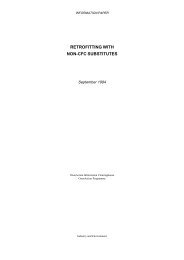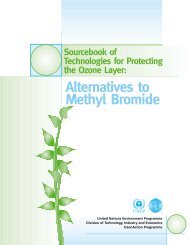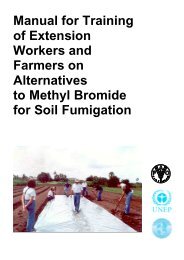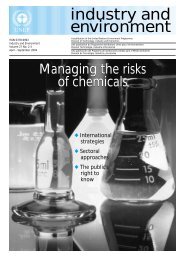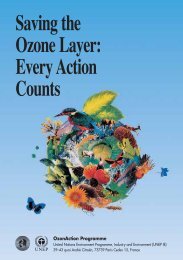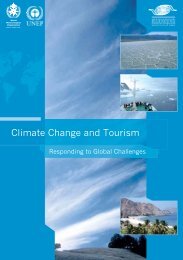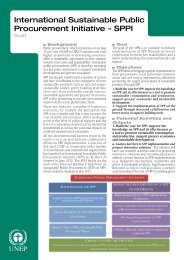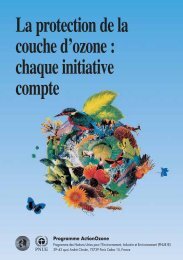Mining and Sustainable Development II - DTIE
Mining and Sustainable Development II - DTIE
Mining and Sustainable Development II - DTIE
You also want an ePaper? Increase the reach of your titles
YUMPU automatically turns print PDFs into web optimized ePapers that Google loves.
THE UNEP DIVISION OF TECHNOLOGY,<br />
INDUSTRY AND ECONOMICS<br />
Current uses <strong>and</strong> development of natural resources, technologies<br />
<strong>and</strong> production processes, as well as urbanization patterns,<br />
have negative effects on human health <strong>and</strong> the environment.<br />
This is illustrated by unsustainable use of water, l<strong>and</strong> <strong>and</strong> energy,<br />
air <strong>and</strong> water pollution, persistent <strong>and</strong> toxic bio-accumulative<br />
chemicals in the food chain, <strong>and</strong> other industry-related<br />
problems. To have a healthy environment, we need to change<br />
how we produce <strong>and</strong> consume goods <strong>and</strong> services. This<br />
change involves revising <strong>and</strong> developing economic policies<br />
<strong>and</strong> trade practices so as to integrate environmental issues in<br />
the planning <strong>and</strong> assessment processes.<br />
UNEP’s Division of Technology, Industry <strong>and</strong> Economics (UNEP<br />
<strong>DTIE</strong>) was created in 1998 to help decision-makers in governments,<br />
local authorities <strong>and</strong> industry develop <strong>and</strong> adopt policies<br />
<strong>and</strong> practices that:<br />
• are cleaner <strong>and</strong> safer;<br />
• use natural resources efficiently;<br />
• ensure adequate management of chemicals;<br />
• incorporate environmental costs;<br />
• reduce pollution <strong>and</strong> risks for humans <strong>and</strong> the environment.<br />
UNEP <strong>DTIE</strong>, whose main office is in Paris, is composed of:<br />
◆ The International Environmental Technology Centre<br />
(Osaka), which promotes the adoption <strong>and</strong> use of environmentally<br />
sound technologies, with a focus on the environmental<br />
management of cities <strong>and</strong> freshwater basins, in<br />
developing countries <strong>and</strong> countries in transition.<br />
◆ The Production <strong>and</strong> Consumption Unit (Paris), which fosters<br />
the development of cleaner <strong>and</strong> safer production <strong>and</strong><br />
consumption patterns that lead to increased efficiency in the<br />
use of natural resources <strong>and</strong> reductions in pollution.<br />
◆ The Chemicals Unit (Geneva), which promotes sustainable<br />
development by catalyzing global actions <strong>and</strong> building national<br />
capacities for the sound management of chemicals <strong>and</strong> the<br />
improvement of chemical safety world-wide, with a priority on<br />
Persistent Organic Pollutants (POPs) <strong>and</strong> Prior Informed<br />
Consent (PIC, jointly with FAO).<br />
◆ The Energy <strong>and</strong> OzonAction Unit (Paris), which supports<br />
the phase-out of ozone depleting substances in developing<br />
countries <strong>and</strong> countries with economies in transition, <strong>and</strong> promotes<br />
good management practices <strong>and</strong> use of energy, with a<br />
focus on atmospheric impacts. The UNEP/RISØ Collaborating<br />
Centre on Energy <strong>and</strong> Environment supports the work of this<br />
Unit.<br />
◆ The Economics <strong>and</strong> Trade Unit (Geneva), which promotes<br />
the use <strong>and</strong> application of assessment <strong>and</strong> incentive tools for<br />
environmental policy, <strong>and</strong> helps improve the underst<strong>and</strong>ing<br />
of linkages between trade <strong>and</strong> environment <strong>and</strong> the role of<br />
financial institutions in promoting sustainable development.<br />
UNITED NATIONS ENVIRONMENT PROGRAMME<br />
DIVISION OF TECHNOLOGY, INDUSTRY AND ECONOMICS<br />
39-43, QUAI ANDRE-CITROEN<br />
75739 PARIS CEDEX 15, FRANCE<br />
TEL: (33) 1 44 37 14 50<br />
FAX: (33) 1 44 37 14 74<br />
E-MAIL: unep.tie@unep.fr<br />
http://www.uneptie.org/home.html<br />
FEEDBACK<br />
If you would like to respond to something you’ve read here –<br />
to agree or disagree with a point of view, clarify a fact,<br />
or provide additional information – write to us. If you would like<br />
to air your views on any other subject relevant to Industry <strong>and</strong><br />
Environment, we would also like to hear from you. As space is limited,<br />
we cannot guarantee to publish all letters, or to publish long<br />
ones in full.<br />
Send your Feedback letters to:<br />
Feedback<br />
Industry <strong>and</strong> Environment review<br />
UNEP <strong>DTIE</strong><br />
Tour Mirabeau<br />
39-43, quai André-Citroën<br />
75739 Paris Cedex 15, France<br />
Fax: +33 (1) 44 37 14 74<br />
E-mail: unep.tie@unep.fr<br />
UNEP Industry <strong>and</strong> Environment – Special issue 2000 ◆ 95



